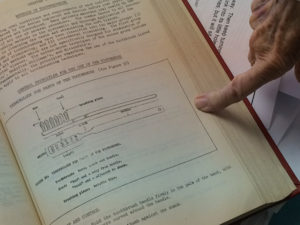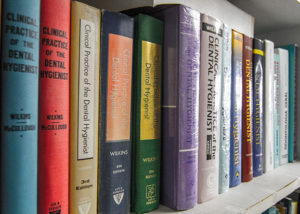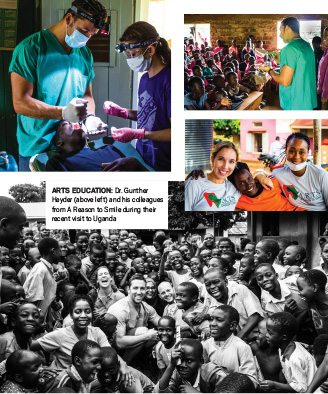IN MEMORIAM
PASSING OF A PIONEER
DR. ESTHER M. WILKINS, 1916–2016
“She set the standard for how everybody began to teach dental hygiene.”

A LIFE IN LETTERS: Dr. Wilkins’s textbook, first published in 1959, is now in its twelfth edition.
IT WOULD BE DIFFICULT, verging on impossible, to overstate the impact on dentistry, dental hygiene and the advancement of women in our profession that was exerted by Dr. Esther M. Wilkins, who died December 12, 2016, three days after her 100th birthday. “Her contributions to the field of dentistry span decade upon decade,” Incisal Edge wrote two years ago, when we bestowed upon her our “Industry Icon” award.
Wilkins’s signature achievement in a life overflowing with them was surely the 1959 publication of Clinical Practice of the Dental Hygienist, a seminal textbook now in its twelfth edition. The book grew out of a scattered pile of handouts Wilkins had written over the course of her first job out of dental school; in the middle of the twentieth century, information about the practice of dental hygiene was both scant and woefully out of date. “She set the standard for how everybody began to teach dental hygiene, and that was the tipping point,” Ann Battrell, CEO of the American Dental Hygienists Association, told the New York Times after Wilkins’s death.
In 1964, Wilkins returned to her alma mater — Tufts University School of Dental Medicine, from which she graduated in 1949 as just one of three women in her class — and taught there for more than four decades; she was named professor emeritus in 2011. The American Dental Association once lauded her as “a shining star in dental and allied dental education,” and that much was clear on Tufts Dental’s campus, where she had become something of a celebrity, according to Dr. Huw F. Thomas, the school’s dean. “You’d see a line of people waiting to shake her hand and saying, ‘Please sign my book, Esther!’ ” Dr. Thomas said. “If only they treated deans of dental schools like that.”
DR. GUNTHER HEYDER remembers the moment last December when he realized that A Reason to Smile (A.R.T.S.), the nonprofit he founded to promote dental care across Africa, was really beginning to click. Dr. Heyder and his team were in Uganda for a 10-day visit. Surveying people at check-in, they determined that nearly 200 of the 550 attendees had never seen a dentist — and most others had done so just once or twice in their lives. Yet on the penultimate clinic day, a 27-year-old Ugandan named Chata “picked up the demonstration brush and teeth, and gave an oral-hygiene lesson to the crowd waiting in line,” Dr. Heyder recalls. “He had watched, translated and learned the material for four days, and was ready to take over the lesson — in his own language to his own people.”
That’s precisely the outcome Dr. Heyder, who practices at Atlantic Dentistry in Kitty Hawk, North Carolina, had in mind when he founded A.R.T.S. in 2014. Hailing from a family of medical practitioners — his older brother, Markus, is the owner of Atlantic — Dr. Heyder volunteered in Ghana, Malawi and Togo while he was a dental student at the University of North Carolina, experiences that provided the impetus for A.R.T.S., which focuses on community empowerment in addition to medical aid.
CHANGE AGENT
A.R.T.S., the foundation created by Outer Banks dentist Dr. Gunther Heyder, gives A GREAT NUMBER of Africans a reason to smile.
A.R.T.S. made its first trip, to Senegal, in March 2015; over the course of its existence the group has seen nearly 2,000 patients and educated hundreds more during visits to African schools. Mariel Butan, A.R.T.S.’ director of communications and operations, shares one memorable story from that same Uganda visit. “During a meeting with local leaders in a village, a businesswoman asked why she continued to have pain even though she brushed her teeth every day,” Butan says. “In addition to the usual review of proper brushing techniques, I brought up a new subject: dental floss. As I held up the tiny white container, the shock of the introduction was palpable. The most respected and well-traveled members of this community had never heard of this tool which
so many of us take for granted.”
That in turn serves as something of a metaphor for the charitable efforts Dr. Heyder makes on behalf of the people of Africa: “The unknown can always present obstacles and
be a source of anxiety,” he says. “But if your passion and commitment are strong, you will find clarity and build confidence.”





